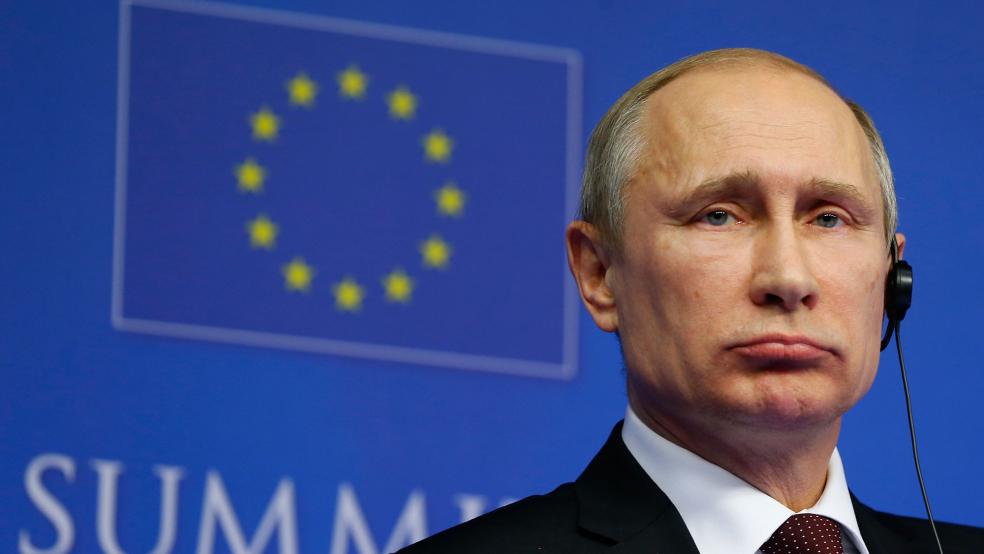President Obama announced a new round of sanctions against Russia today, and for once, he wasn’t alone: the European Union, long reluctant to impose new penalties because of close economic ties to Russia, had done the same thing earlier Tuesday.
Since the Ukraine crisis began, the European media and the European public outside of the Netherlands have appeared reluctant to do much to punish Russia. European politicians paid lip service to sanctions, imposing watered-down measures that did little to impact Russian behavior in Ukraine.
Related: Russian Oligarchs Are Tired of Funding Putin’s Land Grab
All of that changed when Malaysian Airlines Flight 17 was shot down in eastern Ukraine, allegedly by separatists armed with Russian weapons supplied by Putin. In the time since, Putin has appeared undeterred, increasing supplies to rebels while blaming the west for the tragedy.
This has infuriated the European public and media, especially the Netherlands, a country that lost 193 people on the plane. Dutch Prime Minister Mark Rutte and the Dutch media have demanded access to the crash site, which is up for grabs in fighting between Ukrainian security forces and rebels. The rest of Europe has slowly followed suit, resulting in the sanctions announced yesterday.
The Fiscal Times decided to audit the European press to see how major newspapers were covering this landmark policy shift.
Germany’s Der Spiegel, a reliable barometer of the opinions of the German political and media elite, demanded that Berlin do more to confront Putin. On Sunday, they published pictures of Malaysian Airline victims on the cover of their magazine, with the headline, “Stop Putin Now.” Inside, the magazine published a series of articles on the crash and Putin’s power grab in Ukraine, with nearly all coming to the same conclusion: Putin was responsible and he must pay.
On its English language site, the magazine also published an editorial condemning Putin to a wider international audience.
“While the West initially imposed but mild sanctions and demanded a policy of de-escalation, Putin repeatedly escalated the conflict while vociferously proclaiming his irreproachability,” the authors wrote. “He continually insisted that he wasn't behind the separatists. This web of lies, propaganda and deceit has now been exposed.”
Related: How Obama Lost Friends in Europe and Influence Globally
The German turnaround is a stunning one; last week, some German businesses and politicians were warning that any new penalties against Russia would hurt the German economy. Some even suggested taking away the 2018 World Cup, scheduled to be held in Russia, as a limp alternative to new sanctions.
German public opinion, which has historically shown a favorable view of Putin, has also shifted. According to a Der Spiegel poll, 52 percent of the population now supports the sanctions, even if it translates into some job destruction.
Even Germany’s old guard media, typically pro-business and pragmatic, have condemned Putin’s action. The Frankfurter Allgemeine newspaper published “The Putin System” condemning the way that the Russian president and his henchmen run the country.
Related: Russia, U.S. Edge Toward Economic Warfare
In France, the media also racketed up its negative coverage of Putin. Libération's Sanctions: Europe's late wake-up, commented on the lateness of the European Union's sanctions, despite pressures from the U.S. to act against Russia.
Although the 28 EU countries were split between Eastern European countries, especially Poland, which were leaning toward more stringent sanctions, and other countries that were worried about their gas supply, the plane crash in Ukraine was determinant in the decision of the EU to agree to the sanctions.
Libération considers that the EU policy has turned a corner in its relationship with Moscow and that the decision of the sanctions will be a hard blow against the Russian economy, which is already weakened. It also noted that Moscow has already retaliated by curbing its European import of fruits and vegetables.
Le Figaro commented that one of the difficulties of the negotiations lay in the fact that the EU had to come up with sanctions that would be fair for all 28 EU countries, all of which have economic interests at stake. It also noted that the French contracts involving the sale of the Mistral ships to Russia wouldn’t be impacted.
Le Monde noted that the Russian gas sector, on which Europe is highly dependent, wasn't targeted by the sanctions. It also echoed Liberation saying that in only a few days, the Malaysia Airlines plane crash in Ukraine turned the Russian president from a trusted interlocutor to a pariah.
Even the Italian media, which is currently obsessed with the Costa Concordia saga, has taken the time to blast Putin. The editors of the Corriere della Sera, one of the country’s largest newspapers and one often dismissive of Putin’s actions in the past, took him to task in an editorial published Tuesday.
“The United States has concluded, has taken charge of the international response, and once the investigations are complete will help to bring to justice those responsible for the plane crash,” the editors wrote. “Putin will have to answer.”
Top Reads from The Fiscal Times






